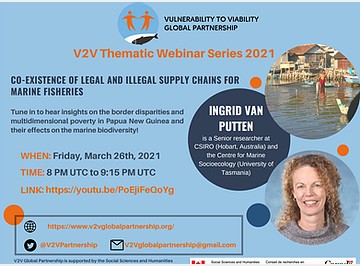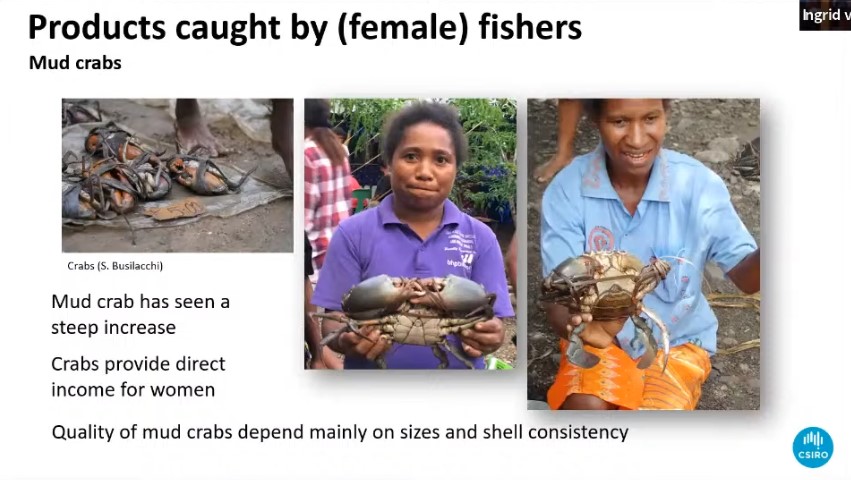 In the third of the monthly thematic webinars of the V2V research partnership about exploring ways to lead small-scale fisheries from vulnerability to viability, on 27 March 2021, Ingrid van Putten of CSIRO in Australia shared research results into the marketing of four major marine commodities from the so-called Treaty villages in Papua New Guinea. Lack of information, skills and support systems for communities in the coastal villages of Torres Strait mean that swimbladders of Barramundi and Jewfish considered a delicacy and an aphrodisiac in countries like China, dried bêche de mer and shark fins produced by men and live mud crabs caught by women fetch low prices, especially when sold illegally to Indonesian traders conveniently going from house to house to buy the catch.
In the third of the monthly thematic webinars of the V2V research partnership about exploring ways to lead small-scale fisheries from vulnerability to viability, on 27 March 2021, Ingrid van Putten of CSIRO in Australia shared research results into the marketing of four major marine commodities from the so-called Treaty villages in Papua New Guinea. Lack of information, skills and support systems for communities in the coastal villages of Torres Strait mean that swimbladders of Barramundi and Jewfish considered a delicacy and an aphrodisiac in countries like China, dried bêche de mer and shark fins produced by men and live mud crabs caught by women fetch low prices, especially when sold illegally to Indonesian traders conveniently going from house to house to buy the catch.
The same catch could be sold legally within the PNG marketing system, but several burocratic and logistic obstacles push many fishers into the arms of the illegal traders, who in turn also provide fuel, credit and other services creating a strong dependent relationship. The complete lack of refrigeration facilities is among the hinderances of getting a higher value product to the town of Daru for legal marketing. One of the collateral damage of this is also the waste of perfectly edible meat of Barramundi (Lates calcarifer), Jewfish (several species are called commonly Jewfish, among others, black croaker, Protonibea diacanthus) and sharks, including protected species, as most of the catch can not be locally consumed or preserved and so their carcasses are discarded. Enforcement capacity of the rules by PNG officials is low.
 The researchers found that the mark-ups of the Indonesian traders when selling the products on to Chinese and other Asian markets are up to 20fold the price paid to the fishers. When the researchers provided feedback on their results to the fishers, they encountered great surprise as the geographical isolation, relative poverty and challenging communication along the coast had prevented the fishers from understanding the conditions and that the co-existence of legal and illegal marketing chains had been used so much to their disadvantage. In workshops the men and women generated a lot of ideas about how to change the situation for the better.
The researchers found that the mark-ups of the Indonesian traders when selling the products on to Chinese and other Asian markets are up to 20fold the price paid to the fishers. When the researchers provided feedback on their results to the fishers, they encountered great surprise as the geographical isolation, relative poverty and challenging communication along the coast had prevented the fishers from understanding the conditions and that the co-existence of legal and illegal marketing chains had been used so much to their disadvantage. In workshops the men and women generated a lot of ideas about how to change the situation for the better.
A follow-up project will focus on working particularly with the women fishers as a promising way to improve the livelihoods of the families. All resources have seen exploitation levels increase and it is unlikely that marine resources alone can meet the needs of a population further increased by migrants with different ethnic backgrounds from inland who have lost their livelihoods as a result of environmental destruction of the Fly River catchment from the Ok Tedi mine. Developing solutions will remain challenging. See the entire webinar here.









